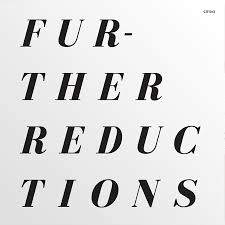Although New York’s Shawn O’Sullivan has recently risen to acclaim with projects under his own name, and his Vapauteen and 400PPM aliases for L.I.E.S. and Avian respectively, less well known is his earlier music career, even if it is well documented. Long a synthesiser enthusiast and a DJ whose knowledge spans hardcore rave, gabba, techno, noise, industrial, cold wave and minimal synth, O’Sullivan was a member of New York’s non-techno experimental underground in the quiet years before the resurgence of the dance scene. He repeatedly has cited disillusionment with the techno of that era as a reason for turning his back on it, but he was hardly quiet: as a member of the trio Led Er Est, he recorded a series of electronic albums for Wierd Records, Mannequin, and Sacred Bones from 2009-2012 that established his stylistic imprint and slowly brought him to where he now stands.
Further Reductions is actually one of his older projects, having made its debut on Captured Tracks in 2010, and it has been fascinating to watch its evolution through a series of live shows in New York in the intervening years. Initially started as a more pop-leaning cold wave and industrial duo with Katie Rose, like his own music it has grown more propulsive and even more analogue as time as moved on to encompass full-tilt Downwards-esque techno alongside more reflective moments. Much like O’Sullivan’s other work, the music of the duo had clearly been building towards something, and it arrives with Woodwork, their new LP on Minimal Wave sub-label Cititrax, which features six varied and accomplished tracks that process their wide range of influences into a deeply composed whole.
O’Sullivan has long locally been one of the most knowledgeable authorities on his particular end of the musical spectrum, with a seemingly inexhaustible supply of tips and commentary concerning esoteric music from the 1970s onwards. How this translates into his own music is generally less clear: he insists on an improvisatory approach to solo sets to retain gut impact, and this can lead to quite wide ranging results depending on the setting. With Rose as a partner, the pace is pared back and the atmosphere increased, allowing an expression of the duo’s shared music interests that are present but not always obvious in his solo work. It also makes for a remarkably diverse listen that maintains cohesion over the six tracks presented, given the relatively brief duration of the record at just over half an hour.
The album is split between slower, more vocal-heavy pieces, whose most obvious inspiration is Chris & Cosey, and pacier, dancefloor-leaning workouts that remain more extroverted than what is usually found in O’Sullivan’s solo catalogue. In the case of the title track, the duo contrasts ethereal pad sequences with a much rougher, bass line before bringing in industrial elements. It navigates between straighter rhythmic segments and passages that suggest rolling, woodblock-based breaks. If it’s not as searing as his solo work, it is still quite intense, but they show their flair for more spacious techno on ‘Beyond Time’, a smartly-produced percussion-centred affair where a rigid upbeat hat provides the framework for plentiful toms and an array of changing, precise accents in the shifting drum machines.
The vocal tracks for the most part take things at a significantly slower tempo, but even then the duo make plenty of room for diverse stylistic ideas. Rose’s vocals are used most often with heavy atmospheric effects and buried in the mix; sometimes they’re almost unrecognisably altered with effects. The degrees which these different approaches are used varies considerably; for opener ‘High End Basics’ her deadpan sing-speak is mixed especially low but less effected than average, while on ‘Spectacle Dissolved’ she is more exposed but thoroughly treated with atmospheric effects and wrapped in the gauzy, melodic pad. The two vocal tracks on the B-side move further down the path towards total submersion, with her heavily-processed singing on the ominous ‘Void Of Course’ being frequently over-run completely by the rhythm tracks. Closer ‘Death To The Beat’ is striking for its roots in old-school house and acid, and also for the most abstract use of vocals on the record, which sees them vocoder-ed nearly to the point of complete abstraction.
Even considering the short running time of Woodwork, Further Reductions have given listeners great deal of diverse material to dig into. The duo have a profound grasp on the history of techno, house, and dark electronic music, and their ability to pay homage to these historical moments while at the same time sounding contemporary puts them clearly ahead of many artists whose work remains closer to revivalism in spite of modern sound ideas. The depth of O’Sullivan’s solo work continues to stand without serious doubt, but the degree to which the music here differs offers a revealing look in his and Rose’s musical history and interests. It’s another remarkable album for a producer who has made a powerful entrance onto the scene in past years, and it suggests even stronger things ahead, for both him and Further Reductions.


